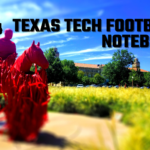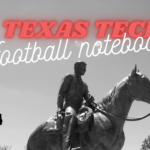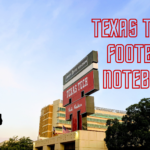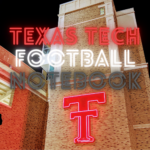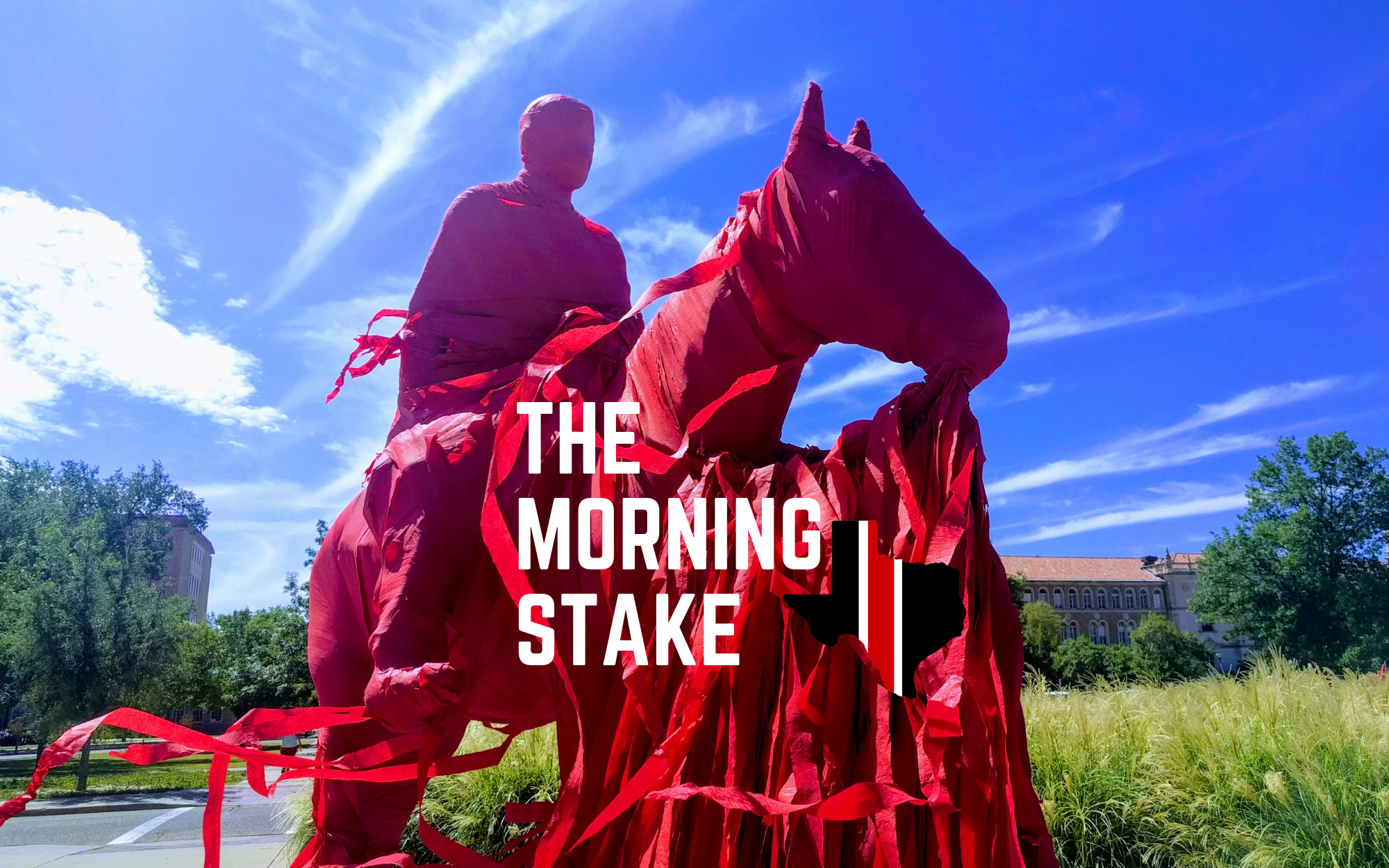 Devastating news for Devan Cambridge, last night’s injury was a season-ending injury and think a good thought for Cambridge. This obviously has implications for the team as well, there is no one on the roster that can do what he can do, but now we know why head coach Grant McCasland decided to play Kyeron Lindsay and not use this redshirt year.
Devastating news for Devan Cambridge, last night’s injury was a season-ending injury and think a good thought for Cambridge. This obviously has implications for the team as well, there is no one on the roster that can do what he can do, but now we know why head coach Grant McCasland decided to play Kyeron Lindsay and not use this redshirt year.
 Congrats to the women’s soccer program as they’ve finished 9th in the United Soccer Coaches Association poll, the highest finish in program history!
Congrats to the women’s soccer program as they’ve finished 9th in the United Soccer Coaches Association poll, the highest finish in program history!
 Texas Tech defeated Sam Houston State on Tuesday night, after a slow first half, Texas Tech poured it on in the second half, Kilah Freelon scored 16 going 8 for 8 from the field, jasmine Shavers scored 22, and Bailey Maupin had a double-double, scoring 15 and dishing 11 assists. The Lady Raiders will host Incarnate Word on December 13th and then participate in the Maui Classic starting December 19th.
Texas Tech defeated Sam Houston State on Tuesday night, after a slow first half, Texas Tech poured it on in the second half, Kilah Freelon scored 16 going 8 for 8 from the field, jasmine Shavers scored 22, and Bailey Maupin had a double-double, scoring 15 and dishing 11 assists. The Lady Raiders will host Incarnate Word on December 13th and then participate in the Maui Classic starting December 19th.
 Congrats to Tony Bradford, Jr. who was named the winner of the Pop Warner College Football Award, which goes to the senior who “made a difference on the field, in the classroom and in the community and serves as a role model to Pop Warner’s young student-athletes.”
Congrats to Tony Bradford, Jr. who was named the winner of the Pop Warner College Football Award, which goes to the senior who “made a difference on the field, in the classroom and in the community and serves as a role model to Pop Warner’s young student-athletes.”
 Congrats to Gerald Garcia and Jordan Brown for receiving that scholarship!
Congrats to Gerald Garcia and Jordan Brown for receiving that scholarship!
Three words a walk-on will never forget:
“You’re on scholarship.”
Congrats, @ginogarcia__ and @JordanBrown6ix! pic.twitter.com/XLcZuiEBdh
— Texas Tech Football (@TexasTechFB) December 6, 2023
 Tyler Shough committed or chose Louisville as his next destination, his 7th year. I think that Shough is a fantastic teammate and the fact that McGuire actually spoke glowingly about him as he decided to transfer says something about him. The writing was on the wall here at Texas Tech and this is Behren Morton’s job for the time being and I think the foreseeable future.
Tyler Shough committed or chose Louisville as his next destination, his 7th year. I think that Shough is a fantastic teammate and the fact that McGuire actually spoke glowingly about him as he decided to transfer says something about him. The writing was on the wall here at Texas Tech and this is Behren Morton’s job for the time being and I think the foreseeable future.
doing what we love 🎬 pic.twitter.com/nALPq0EgrI
— Texas Tech Football (@TexasTechFB) December 7, 2023
 This was interesting. West Georgia University quarterback Cameran Brown (6-2/225) has committed or decided to transfer to Texas Tech. Brown appears to be a dual-threat quarterback, passing for 914 yards, 10 touchdowns and 6 picks, while running for 478 yards and 6 touchdowns. Brown has serious wheels and an okay arm (we only get to to see the good stuff). How is this going to work? I have no idea, but I’m interested.
This was interesting. West Georgia University quarterback Cameran Brown (6-2/225) has committed or decided to transfer to Texas Tech. Brown appears to be a dual-threat quarterback, passing for 914 yards, 10 touchdowns and 6 picks, while running for 478 yards and 6 touchdowns. Brown has serious wheels and an okay arm (we only get to to see the good stuff). How is this going to work? I have no idea, but I’m interested.
100% committed🖤‼️@TexasTechFB @ZKittley @TTUKirkBryant pic.twitter.com/fiedbpTVjB
— Cameran Brown (@cameran_brown) December 7, 2023
 CBS Sports’ Dennis Dodd and Yahoo’s Ross Dellenger break down the NCAA proposal to subdivide the NCAA into the “have’s” and “have not’s”. I’m linking to two writers because I think that both writers are pretty dialed in, maybe Dellenger more than Dodd. In any event, here’s a summary of the proposal:
CBS Sports’ Dennis Dodd and Yahoo’s Ross Dellenger break down the NCAA proposal to subdivide the NCAA into the “have’s” and “have not’s”. I’m linking to two writers because I think that both writers are pretty dialed in, maybe Dellenger more than Dodd. In any event, here’s a summary of the proposal:
Entry into the subdivision requires a school to invest, at minimum, $30,000 per year per athlete into what is termed an “enhanced educational trust fund” for at least half of a school’s countable athletes. Schools would determine when athletes receive the amount, which, for four-year athletes, will total at least $120,000. Schools must continue to abide by the framework of Title IX, assuring that 50 percent of the investment be directed toward women athletes.
The new subdivision will remain under the umbrella of the NCAA, and its members will continue to compete for NCAA championships with others in Division I. Under the proposal, the NCAA maintains oversight of the existing national championship model across all Division I sports, except FBS football, which continues to operate under the rubric of the College Football Playoff, Baker writes in the letter.
Schools in the new subdivision would also gain control of decision-making around scholarship limits and countable coaches, the NCAA’s way of handing major conference programs the freedom to increase the limits or do away with them altogether.
The model “gives the educational institutions with the most visibility, the most financial resources and the biggest brands an opportunity to choose to operate with a different set of rules that more accurately reflect their scale and their operating model,” he writes.
If you want to know how this will actually work, ESPN’s Dan Murphy has a good look at the mechanics of how this would work. I feel like Texas Tech through it’s collective is already doing some of this so that doesn’t bother me. The other part that I am not smart enough to figure out is that I think that the NCAA would need a federal legislative antitrust exemption because I’ve always thought that the next thing coming down would be revenue sharing. If the NCAA is trying to keep the players from that, then I think that would require an exception. Again, I’m not smart enough to know about this, just something to chew on. That’s mentioned a bit in the Murphy article, but not the stuff about not sharing revenue.
The NCAA could also avoid some of its looming legal issues if Congress passes a new law that declares that college athletes are not school employees and provides antitrust exemptions that college sports leaders say would allow the association to make rules about transfers, NIL transparency or other subjects without the fear of being sued. Baker and many of his colleagues have been asking for such a law for the past several years.
Despite more than a half dozen proposed bills in the past few years, little tangible progress has been made toward voting on a new college sports law. Several U.S. senators have told Baker and others that the NCAA needs to do more for athletes if Congress is going to help. Sen. Chris Murphy (D-CT), who has been one of the NCAA’s sharpest critics on Capitol Hill, said that yesterday’s announcement was a small but positive step in the right direction.
“It has been a slow and painful process, but the NCAA is finally realizing if they want to survive, business as usual is not an option,” Murphy said.
Yahoo’s Ross Dellenger paints a picture of college athletic leaders shocked at this NCAA proposal:
Around the college athletics space, people were sent scrambling Tuesday morning as the memo hit their inboxes. Some university boards held emergency meetings to discuss the matter. School and conference general counsels combed over the memo with their best microscopes. NIL collectives gathered on a call to discuss its potential impact.
Everyone, Baker suggested, needs to chill. Take a deep breath. Calm down. His proposal is “what we call a place to start,” he said.
Serious conversations around the matter will start in earnest — as in Thursday, during a scheduled call with the Division I Board of Directors, said Baylor president Linda Livingstone, one of the most powerful figures in the industry who appeared at Wednesday’s function.
Ultimately, leaders need to create actual legislation, socialize such legislation and get the requisite number of votes from the full Division I membership to pass the legislation. It is unlikely that such a move could happen by or at the NCAA convention next month in Phoenix, Livingtone said.
Expect changes to the proposal, tweaks and adjustments, from the feedback that leaders give.





